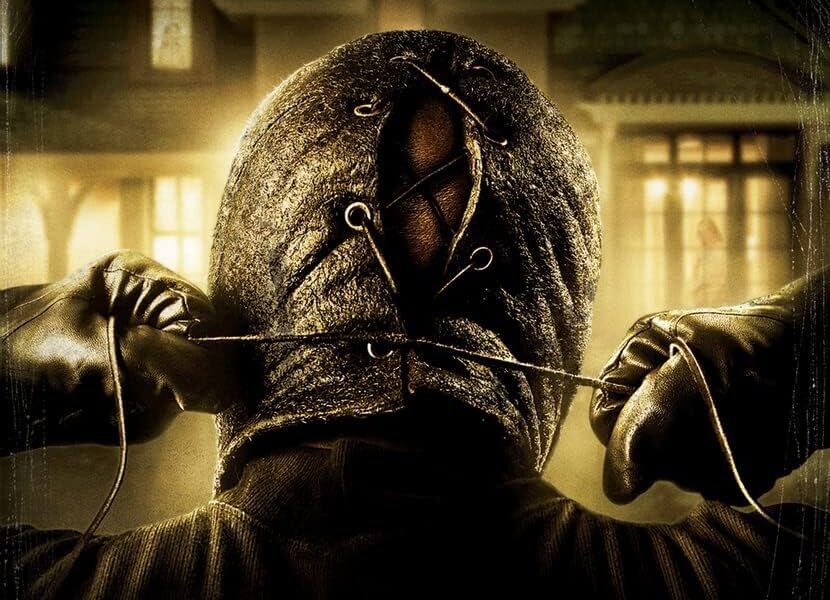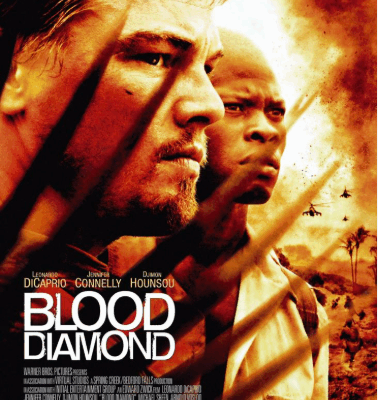Movie Overview
- Title: The Collector (2009)
- Release Date: July 31, 2009 (U.S.)
- Genre: Horror / Thriller / Home-Invasion / Trapped House Horror
- Director: Marcus Dunstan
- Main Cast:
• Josh Stewart as Arkin O’Brien
• Michael Reilly Burke, Andrea Roth, Juan Fernández (as the masked “Collector”)
• Karley Scott Collins, Madeline Zima among others - Where to Watch: The film has been available via digital rental / streaming (e.g. on Fandango at Home)
1. Plot Summary (Concise, with minimal spoilers)
Arkin O’Brien, a handyman and ex-con, is in financial straits: his ex-wife owes debt to dangerous people, and he needs money to protect his family. To solve this, he plots a burglary: stealing a rare gem from the safe in the home of the wealthy Chase family — a house he has worked in.
However, when Arkin breaks in at night, he finds the house already rigged with deadly traps, and the family has been kidnapped or trapped by a mysterious, masked killer known as “The Collector.” He becomes trapped in a high-stakes cat-and-mouse game: he must navigate lethal devices, rescue those still alive, and survive while being hunted.
Thus, what begins as a criminal heist evolves into a survival horror scenario, where Arkin’s own plan collides with the sadistic design of a far more dangerous adversary.
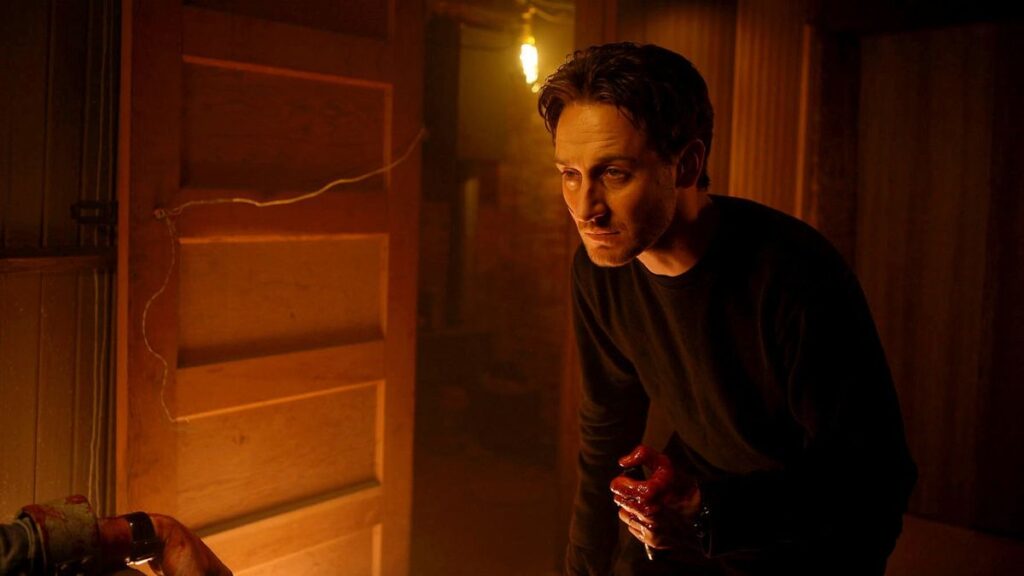
2. Notable Elements
What Works / Standout Features
- Genre Mash & Premise Twist: The film starts with a heist / thriller setup, then morphs into a horror trap house narrative. That blending of genres gives it some freshness, as Arkin’s morally dubious plan becomes forced into heroism.
- Trap Design / Tension & Gore: The traps are inventive and gruesome. Scenes involving razor blades, acid, immobilizing contraptions, and environmental hazards generate visceral tension. Lovers of gore will find many “wow” moments.
- Silence & Stealth Moments: The film uses silence and the need for stealth well. Because Arkin cannot always speak, many sequences rely on tension, ambient sound, creaking doors, shadows — these help sustain horror atmosphere.
- Sympathetic Lead: Josh Stewart gives Arkin a tangible fragility; he isn’t an action hero. He makes mistakes, gets hurt, has fear. That makes the danger feel more immediate and real.
- Relentless Pacing in Setpieces: Once the traps engage, the momentum rarely stops. The tension climbs as Arkin must make choices quickly under threat.
What Doesn’t Work / Weaknesses
- Thin Motivations / Villain Ambiguity: The masked Collector is mysterious, but his motivations stay vague. We don’t learn much about why he traps families (beyond sadistic impulse). That leaves him less compelling as a villain.
- Escalation Stretching Credulity: As traps become more elaborate, some feel over-the-top or contrived. Some devices strain believability, and the narrative occasionally asks you to suspend too much disbelief.
- Character Depth Imbalance: The Chase family, and even Arkin’s motivations (beyond desperation), are not deeply explored. Many characters serve the plot more than feel fully alive.
- Visual / Tonal Familiarity: The film borrows heavily from Saw and other torture-horror films. Some critics see it as derivative (e.g. dark interiors, greenish filters, trap aesthetics).
- Ending / Payoff Issues: The film’s climax and resolution are divisive — some feel the final confrontation lacks weight or leaves too many threads ambiguous.
3. Themes & Messages
- Desperation, Debt & Morality: Arkin’s impetus is debt, familial pressure, and survival. The film probes what a desperate person might be pushed to, and whether crossing moral lines is ever justified under pressure.
- Survival & Resourcefulness: The narrative revolves around improvisation, quick thinking, and perseverance under threat. The film suggests that survival is as much about wits as strength.
- Trap as Punishment / Psychological Theater: The traps are not only physical but symbolic — they force choices, punish greed, test trust. The Collector’s design frames the home itself as a punitive maze.
- Masks, Secrets & Hidden Evils: The notion that evil might be hiding behind normal facades — the home, service staff, or a trusted handyman — plays into horror’s fear of betrayal and infiltration.
While not a holiday or uplifting film, it connects (in a darker way) with themes of redemption, confronting one’s own failings, and protecting loved ones — which can resonate in times when we reflect on sacrifice or moral cost.
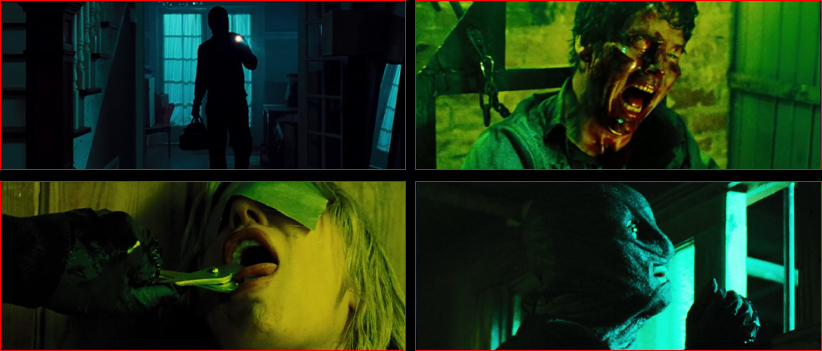
4. Personal Impressions
What I Liked
- The initial shift from heist to horror is clever. I appreciate how the film doesn’t linger too long in setup; once the traps activate, the tension picks up and rarely lets go.
- The trap set pieces are vivid and often creative. Moments where Arkin must choose a path, weighing life vs risk, are gripping.
- Stewart’s performance gives the narrative emotional anchor; as a flawed protagonist, I cared when he got hurt or cornered.
- The use of silence, darkness, off-frame threats, and claustrophobic spaces often works well to create dread.
What I Found Less Effective
- The villain’s lack of background made me less invested in his scheme. Without reason or personality, he feels more a device than a character.
- The escalation sometimes cheats logic; certain traps seem built only for spectacle, not coherent in the layout of the house.
- Secondary characters (family members) are underutilized; their fates matter less because we rarely see much of them before torment.
- The ending, while intense, felt a bit abrupt. I wanted more resolution or reflection.
5. Audience Recommendations
This movie may appeal to:
- Fans of horror / home invasion / trapped house horror, especially those who like Saw-style trap horror.
- Viewers who like tension, traps, stealth, and horror that combines physical danger with psychological dread.
- Audiences who are okay with gore and darker content, and prefer visceral horror to subtle scares.
It might not be good for:
- Viewers who dislike graphic violence, gore, or torture imagery.
- Those who want deeply developed characters or villains with clear motivations.
- Viewers seeking uplifting or hopeful horror — this is brutal fare.
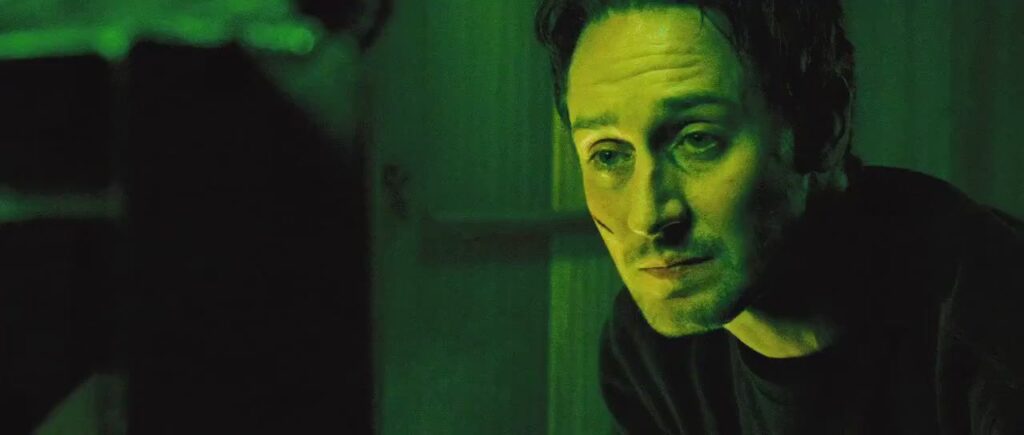
6. Conclusion & Rating
The Collector (2009) is a tense, brutal horror thriller that succeeds in many trap-house set pieces and plays on our fear of being hunted in one’s own space. Its mixture of heist premise and horror escalation gives it some uniqueness. However, its flaws — especially in villain depth and certain overreaching trap designs — keep it from being a perfect horror gem.
Final Recommendation: Watch it if you enjoy immersive, tension-driven horror with traps and claustrophobia. Don’t expect depth or subtlety, but do expect to squirm.
Star Rating: ★★★☆☆ (3 out of 5 stars)
